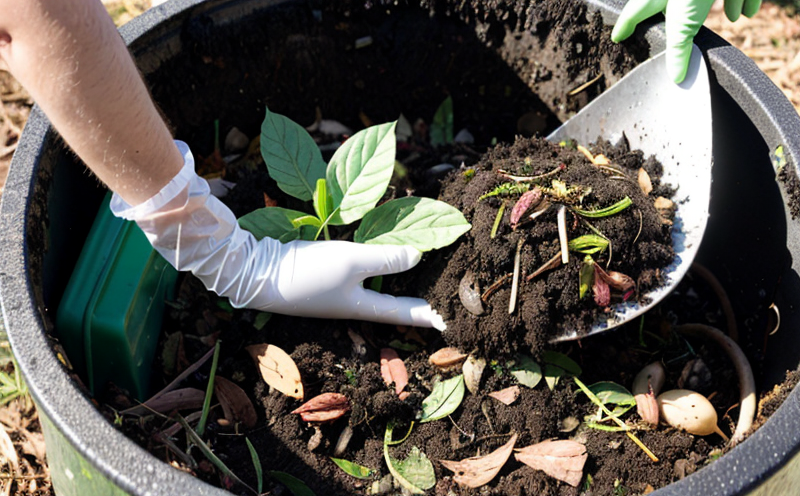FAO Guidelines Microbial Risk Testing in Waste Composting
The Food and Agriculture Organization (FAO) guidelines on microbial risk testing in waste composting are pivotal for ensuring food safety, environmental protection, and public health. These guidelines provide a framework to assess the microbiological quality of composted organic waste used as fertilizer or soil amendment. The primary focus is on ensuring that the compost does not pose a significant health risk when applied to agricultural land.
The FAO guidelines emphasize the importance of microbial indicators such as Escherichia coli, Campylobacter jejuni, and Listeria monocytogenes, which are used to predict the presence of other pathogenic microorganisms. These indicators serve as a proxy for potential contamination by pathogens, ensuring that the compost is safe for use.
The testing process involves several critical steps. Initially, samples of the compost are collected according to predefined protocols. The specimens are then prepared using microbiological methods such as plating or membrane filtration, followed by incubation at specific temperatures and durations to allow microbial growth. Positive cultures are identified through biochemical tests and/or molecular techniques.
The accepted limits for these indicators vary depending on the end use of the compost. For example, if the compost is intended for direct application to food crops, stricter limits apply compared to land where it will not come into contact with edible parts. The FAO guidelines also provide criteria for accepting or rejecting batches based on microbial counts and other relevant parameters.
Microbiological testing in waste composting aims to ensure that the compost does not contain harmful levels of microorganisms that could lead to foodborne illnesses or pose a threat to human health. This is crucial, especially in regions where organic waste management practices are evolving to support sustainable agriculture.
The testing methodology aligns with international standards such as ISO 11469 for quality management systems and ISO 22307-1:2018 for the microbiological examination of compost. These standards provide a robust framework that helps laboratories adhere to best practices, ensuring consistent and reliable results.
Compliance with FAO guidelines is essential for industries involved in waste management and compost production. By adhering to these stringent protocols, companies can demonstrate their commitment to environmental sustainability and public health. This approach not only enhances trust among consumers but also helps meet regulatory requirements in various countries that have adopted these guidelines.
The importance of accurate testing cannot be overstated. Misinterpretation or lack of adherence could lead to the release of contaminated compost into the environment, posing a serious risk to human health and agricultural productivity.
| Use Case/Scenario | Description |
|---|---|
| Compost Quality Assurance | Ensuring that compost meets the required standards before it is marketed or used in agricultural settings. |
| Farm Compliance Monitoring | Monitoring the microbial quality of compost applied to farms to ensure compliance with national and international regulations. |
| R&D for Sustainable Agriculture | Researching new methods to improve the microbiological safety of compost used in sustainable agricultural practices. |
| Environmental Impact Assessment | Evaluating the potential environmental impacts of different types of compost on soil health and water quality. |
The rigorous testing procedures outlined by FAO guidelines are essential for maintaining high standards in waste management and composting. By following these protocols, laboratories can provide accurate and reliable results that are crucial for compliance and public safety.
Eurolab Advantages
- Expertise and Experience: Our team of microbiologists and environmental scientists is well-versed in the FAO guidelines, ensuring precise and accurate testing results.
- Comprehensive Testing Capabilities: We offer a full suite of tests necessary to meet all regulatory requirements for waste composting, including microbial indicators and pathogen presence checks.
- Advanced Laboratory Equipment: Equipped with state-of-the-art microbiological testing instruments, our lab ensures high-precision results that are essential for accurate compliance assessments.
- Comprehensive Reporting: Our detailed reports provide not only the test results but also interpretative insights into what these results mean in terms of food safety and environmental impact.
- Regulatory Compliance: Our testing aligns with international standards, ensuring that clients are compliant with local and global regulations governing waste management and composting.
- Confidentiality and Security: We prioritize the confidentiality of our clients' data, ensuring that all information is handled securely and discreetly.
- On-Time Delivery: Our efficient processes ensure timely delivery of reports, helping clients meet their project deadlines without delay.
At Eurolab, we pride ourselves on providing top-tier testing services that are not only accurate but also aligned with the highest international standards. Whether you're a quality manager, compliance officer, R&D engineer, or procurement specialist, our expertise can help you navigate the complexities of waste management and composting.
Competitive Advantage and Market Impact
- Stricter Compliance Standards: By adhering to FAO guidelines, we set a benchmark for quality that competitors find difficult to match.
- Enhanced Client Trust: Our clients can be confident in the reliability of our testing services, which is crucial for maintaining a positive reputation and attracting new business.
- Innovation and Research Support: We support innovation in waste management by providing data that informs best practices and drives forward research initiatives.
- Cost Efficiency: Our comprehensive approach to testing reduces the likelihood of costly retests or failed audits, leading to long-term cost savings for our clients.
- Market Differentiation: Offering FAO-compliant testing services positions us as a leader in the industry, setting us apart from competitors who may not adhere to such stringent standards.
- Global Recognition: Our adherence to international standards is recognized globally, opening doors for clients looking to expand their operations internationally.
The market impact of our services extends beyond individual clients. By ensuring that the compost used in agriculture meets FAO guidelines, we contribute to broader efforts aimed at improving food safety and environmental sustainability. This not only benefits consumers but also supports the long-term health of ecosystems worldwide.





